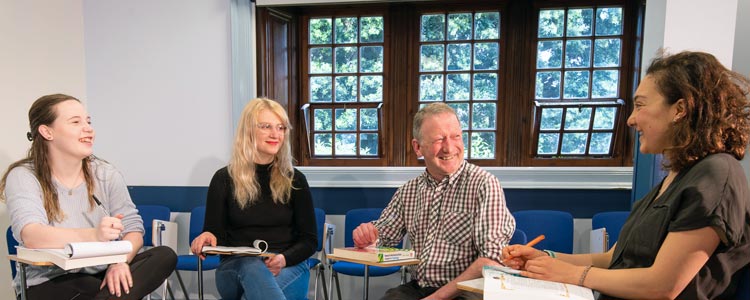Personal Development
Continued Personal Development (CPD) is strongly encouraged for both staff and students within the School. The University has a range of opportunities, some of which are listed below.
Student
-
The University provides two relevant online training courses for students:
-
The School’s ‘Undergraduate Mentoring Scheme’ matches incoming first year undergraduates with current student mentors. The mentoring is designed to develop confidence and offer encouragement, as well as practical help and advice. Students can sign-up as a mentee or a mentor via the University’s Undergraduate Mentoring Schemes website.
Further information for mentors and mentees is provided in the School’s
The University also offers Sports and Music Mentoring Schemes.
-
The University’s International Education and Lifelong Learning Institute (IELLI) offers a range of training opportunities for undergraduate and postgraduate students.
Staff
-
The University has a Dignity and Inclusion portfolio of courses which cover a range of awareness, support and training sessions related to equality, diversity, inclusion and wellbeing issues in the workplace. The courses can be taken in stand-alone form or as part of a portfolio which secures a ‘certificate of recognition’ once all courses are completed. The courses are designed to be useful to all staff, with some being especially useful for those with responsibility for others.
Those interested in taking courses within the portfolio, and want to discuss the content further, can contact capod@st-andrews.ac.uk or a member of the EDI team on diversity@st-andrews.ac.uk.
The University also offers three short, online training courses for staff:
-
The University has a range of mentoring schemes for staff:
- Elizabeth Garrett mentoring programme
- Newly appointed lecturers mentoring scheme
- Professional staff mentoring scheme
- Teaching, research and academic mentoring scheme
The University has a coaching scheme for staff:
-
The University’s International Education and Lifelong Learning Institute (IELLI) provides pedagogical training opportunities for teaching staff, and the Organisational and Staff Development Services (OSDS) is the University’s central provider of professional development for all University staff.
The University supports female academic and professional services staff to attend the Leadership Foundation in Higher Education (LFHE) Aurora programme and Black, Asian and minority ethnic (BAME) academic and professional services staff to attend the Advance HE Diversifying Leadership programme.
-
When writing letters of recommendation, the author's implicit biases can influence how they describe applicants and what they choose to emphasise about them.
For instance, the study 'Raising Doubt in Letters of Recommendation for Academia: Gender Differences and Their Impact' reports that letters of recommendation for female applicants are more likely to include ‘doubt raisers’ (such as ‘even though’ or ‘despite’) than letters for male applicants.
Another study, 'Differences in words used to describe racial and gender groups in Medical Student Performance Evaluations' reports that applicants from minority ethnic backgrounds are less likely than white applicants to be described using ‘stand-out’ adjectives (e.g., ‘exceptional’), regardless of academic ability.
Letters of recommendation should ideally emphasise accomplishments, as well as effort, and caution should be taken with adjectives that might evoke negative stereotypes (e.g., ‘hard-working’, ‘conscientious’ and ‘dependable’). Online text analysis software, such as the Gender Bias Calculator, can be used to test draft letters for biased language. Comments about an applicant’s personal life or individual circumstances (including disabilities or family situations) should only be mentioned at the request of the applicant.
Additional advice and tips are available:
